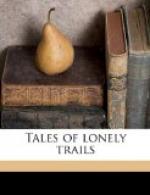On April 20th, 1908, after days on the hot desert, my weary party and pack train reached the summit of Powell’s Plateau, the most isolated, inaccessible and remarkable mesa of any size in all the canyon country. Cut off from the mainland it appeared insurmountable; standing aloof from the towers and escarpments, rugged and bold in outline, its forest covering like a strip of black velvet, its giant granite walls gold in the sun, it seemed apart from the world, haunting with its beauty, isolation and wild promise.
The members of my party harmoniously fitted the scene. Buffalo Jones, burly-shouldered, bronze-faced, and grim, proved in his appearance what a lifetime on the plains could make of a man. Emett was a Mormon, a massively built grey-bearded son of the desert; he had lived his life on it; he had conquered it and in his falcon eyes shone all its fire and freedom. Ranger Jim Owens had the wiry, supple body and careless, tidy garb of the cowboy, and the watchful gaze, quiet face and locked lips of the frontiersman. The fourth member was a Navajo Indian, a copper-skinned, raven-haired, beady-eyed desert savage.
I had told Emett to hire some one who could put the horses on grass in the evening and then find them the next morning. In northern Arizona this required more than genius. Emett secured the best trailer of the desert Navajos. Jones hated an Indian; and Jim, who carried an ounce of lead somewhere in his person, associated this painful addition to his weight with an unfriendly Apache, and swore all Indians should be dead. So between the two, Emett and I had trouble in keeping our Navajo from illustrating the plainsman idea of a really good Indian—a dead one.
While we were pitching camp among magnificent pine trees, and above a hollow where a heavy bank of snow still lay, a sodden pounding in the turf attracted our attention.
“Hold the horses!” yelled Emett.
As we all made a dive among our snorting and plunging horses the sound seemed to be coming right into camp. In a moment I saw a string of wild horses thundering by. A noble black stallion led them, and as he ran with beautiful stride he curved his fine head backward to look at us, and whistled his wild challenge.
Later a herd of large white-tailed deer trooped up the hollow. The Navajo grew much excited and wanted me to shoot, and when Emett told him we had not come out to kill, he looked dumbfounded. Even the Indian felt it a strange departure from the usual mode of hunting to travel and climb hundreds of miles over hot desert and rock-ribbed canyons, to camp at last in a spot so wild that deer were tame as cattle, and then not kill.
Nothing could have pleased me better, incident to the settling into permanent camp. The wild horses and tame deer added the all-satisfying touch to the background of forest, flowers and mighty pines and sunlit patches of grass, the white tents and red blankets, the sleeping hounds and blazing fire-logs all making a picture like that of a hunter’s dream.




